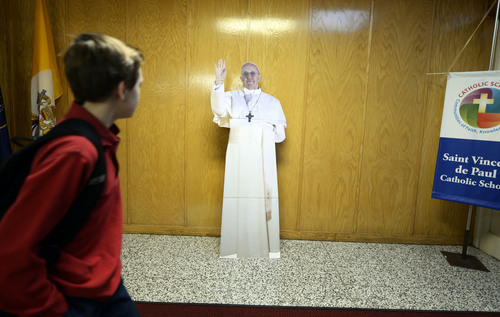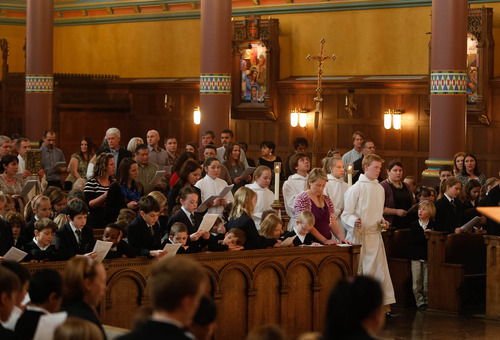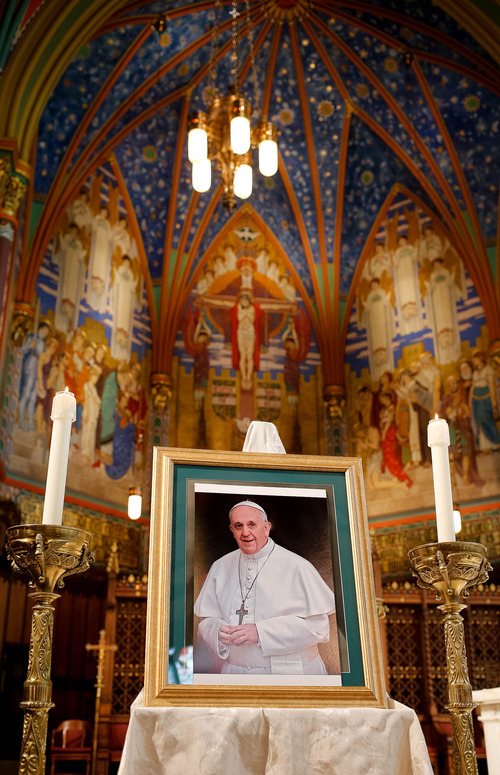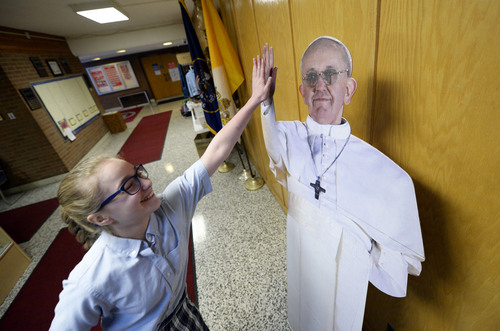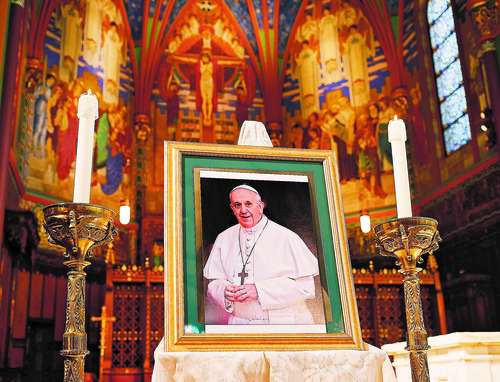This is an archived article that was published on sltrib.com in 2014, and information in the article may be outdated. It is provided only for personal research purposes and may not be reprinted.
In less than a year, a little-known Argentine has shot to fame as Pope Francis, a media superstar who, so the story goes, is bringing almost revolutionary newness to an ancient church while re-energizing a faith demoralized by scandal and malaise.
The Advocate, an American publication for gays, and Time magazine chose the new pontiff as their 2013 Person of the Year, the latter declaring that Francis is "poised to transform a place that measures change by the century."
It is not surprising that the March 13 election of Cardinal Jorge Bergoglio seemed to signal a fresh direction for Catholicism — the then-76-year-old was the first non-European pope in centuries and the first Jesuit and New World cleric ever to become leader of the world's 1.2 billion Catholics. And he was the first to take the name Francis, after the famed St. Francis of Assisi, a peacemaker, lover of animals and servant to the poor.
Since that first puff of white smoke came spiraling out of St. Peter's, Catholics and others have marveled with each new story of the Holy Father's humility — taking the bus back to his apartment rather than the usual Mercedes, paying his own hotel bill, refusing to move into the luxurious papal apartments, washing the feet of female inmates and cradling a disfigured man's face in his hands.
"Every part of his actions at the moment of his election indicated that this man was one of great humility," says Debra L. Adams, a parishioner at St. Vincent de Paul Catholic Church in Holladay. "His first words were, 'Pray for me,' and when he described himself, he said, 'I am a sinner.' "
There's the pope's famous off-the-cuff answer to reporters on the plane coming back from a wildly successful World Youth Day in Rio: "If someone is gay and he searches for the Lord and has good will, who am I to judge?"
And Francis' apostolic exhortation, called "The Joy of the Gospel," expresses his critique of economic inequality, free-market capitalism and neglect of the needy. "How can it be," he laments, "that it is not news when an elderly homeless person dies of exposure, but it is news when the stock market loses 2 points?"
The new pope's "break from his immediate predecessors —John Paul II, who died in 2005, and Benedict XVI, the traditionalist German theologian who stepped down from the papacy [last] February — is less ideological than intuitive, an inclusive vision of the church centered on an identification with the poor," writes James Carroll in The New Yorker. "From this vision, theological and organizational innovations flow. The move from rule by nonnegotiable imperatives to leadership by invitation and welcome is as fundamental to the meaning of the faith as any dogma."
In other words, Francis' style could lead to substantive changes.
Some Catholics resist such oversimplification, wincing whenever the secular media suggest that Francis is remaking the church.
The new pope "is profoundly unique," says the Rev. John Norman, priest at St. Vincent, "and also very similar to his predecessors."
John Paul II, for example, seemed so unlike others when he was elected in 1978, coming from Poland as the first non-Italian in centuries — and with such a charismatic personality. And Benedict was gentler and more conciliatory than his critics imagined him to be.
"People say this pope is so different, but different from what?" Norman asks. "Different from their image of a pope."
—
So what's new? • Like other popes, Francis is an accomplished scholar, leader and theologian, but he also has had "incredible international experience," Norman says. "He's Italian by heritage, so an immigrant to Argentina."
And he seems so "approachable," the Utah priest says. "He seems not to be the least bit hesitant about anything. He seems to be in all kinds of places but constantly present."
The new pope, Norman says, "has a face that communicates concern."
Francis' papacy is "more people-oriented" than previous pontiffs, explains the Rev. Lourduraj G. Gally, who ministers at St. Patrick Catholic Church, an ethnically diverse parish in west Salt Lake City. "He is focused more on the mercy of God and forgiveness."
Gally points to the pope's "who am I to judge?" quote as indicative of Francis' overall approach.
"If someone is gay and honestly searching for God," says the priest, who is originally from India, "the pope doesn't condemn him, just tries to understand him. That's a great way to approach the issue."
Francis is "one of us," says Rosemary Baron, a hospital chaplain in Salt Lake City. "He is accessible with his touching the people, kissing the babies, washing the feet. He wears shoes like we wear, drives cars like we drive, lives in a house like we do. Isn't this what Jesus did? He walks the talk, and we all love him for it."
Utahn Andrew Odoardi, a former high-school teacher and principal, says Francis has changed the tenor of church conversation.
"He brings us back to religiosity rather than politics," Odoardi says. "He's talking about the potential of what Christ taught and how we should behave toward one another."
The Vicar of Christ is "not a radical, but focusing intentionally on issues that are more relevant to Catholics in the pew," he says. "The reality is that most Catholics use birth control. It's not that we are limiting our families, just exercising prudence."
The Rev. Rick Sherman, of Cedar City's Christ the King Catholic Church, does envision "a new era in the making." But he isn't naive about what it will take for this pontiff to shift the church's emphasis to the poor among Utah's 300,000 Catholics and fellow believers across the globe.
"Francis undoubtedly understands the complexities of sociopolitical systems that do not change easily," Sherman says. "I believe he will effectively keep directing us toward Jesus and the Holy Spirit to help us negotiate the complexities of our times. It's our only hope."
Sherman views the pope's directions on taking the pulse of parishioners worldwide as crucial to improving relations between the clergy and their congregations.
"Since most people in the world are not priests, it's wise to emphasize the real day-to-day lives and concerns of the lay majority who are forming the next generation in their homes," the Cedar City priest says. "Despite my love and appreciation for the priesthood, we can probably get a little eccentric at times. The pope, more than any other, can help provide the necessary correctives."
Like Norman, though, Sherman sees continuity rather than a break between the pontificates.
"Pope Benedict, with his heavily academic background and personal familiarity with the enormous expanse of thought and writings of Pope John Paul II, was able to synthesize much of his predecessor's teachings, especially for theologians," the priest says. "This was a contribution, I think, that was often lost in the observations of many commentators and critics."
Now the Argentine leader is "providing a fluid transition to a less erudite and more personal face of Catholicism," Sherman says. "Francis' personality and natural human touch seem to resonate well with the vast majority of people who are not professional theologians, but who can relate to perhaps a theology of compassion and justice."
But will this new approach ultimately make a difference in people's lives?
Some say it already has.
—
Looking within, reaching out • Adams, the St. Vincent parishioner, has taken the pope's example to heart, examining her own motives and choices.
"We are to be humble and trust the leadership of the church as being directed by the Holy Spirit … with more knowledge and wisdom than [I have]," she says. "If we don't agree with something, then we should study the church's position … and trust in their wisdom over our own."
The pope's opposition to opulence — he booted a German churchman known as the "bishop of bling" from his pricey digs — has caused Adams to rethink her economics.
"Am I really spending my time and money for the benefit of the kingdom of God? I have a lot to reflect on in regard to the use of my gifts," she says. "There are people going hungry, and I am concerned about having the latest style of hair color."
The Catholic leader also has found fans in other faiths.
"I have had many people outside of the Catholic Church ask me about him," Adams says. "He certainly has their attention."
Baron, the chaplain, echoes that sentiment.
"In my meditation class, a Mormon classmate, who shared her faith ideas with me, came to a Saturday renewal class some weeks after the class," Baron recalls in an email. "She ran up to me and said, 'We all need your pope. He'll bring us all together.' "
Francis' first year has been a honeymoon of sorts, with pope and populace getting to know each other, withholding strident criticism. That may change as the years go by — there already are hints of displeasure in some conservative quarters.
For now, most are enjoying the joint journey.
"We are learning about the person who has become the pope," Norman says. "That in itself is exciting."
Twitter: @religiongal


